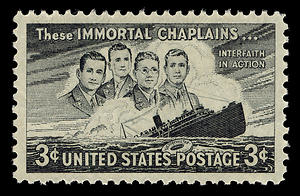by Maria Evans
Readings for the feast day of the Dorchester Chaplains:
“No one has greater love than this, to lay down one’s life for one’s friends.”
Our Gospel reading today pretty much sums up the story of the Dorchester Chaplains, even if you didn’t know another thing about them.
The Dorchester was a cruise-ship-turned-transport-ship during WWII. On the evening of Feb. 2, 1943, she was carrying 902 active duty service personnel, merchant sailors, and civilian contractors. They were only about 150 miles from Greenland (their destination), en route from Newfoundland in U-boat infested waters. The four chaplains, all lieutenants, represented two religions and three Christian denominations–Methodist minister Reverend George L. Fox, Rabbi Alexander D. Goode, Roman Catholic priest John P. Washington and the Reformed Church in America Reverend Clark V. Poling. As chaplains often do, they were hanging out with the troops below deck trying to help them feel at ease. Ship’s captain Hans Danielsen had ordered the men to sleep with their clothes on and their life jackets on, as a submarine had been detected via sonar.
The four chaplains passed out soda crackers for nausea, told stories, joked with the ones nervously playing cards or shooting dice, and calmed the fears of the ones lying on their bunks, too scared to participate. Many of the troops were not wearing their life jackets, despite the order, because of the heat of the engine below, and because they were uncomfortable.
Around 1 a.m. on the morning of Feb. 3, a torpedo from the submarine U-223 hit the starboard side of the Dorchester, well below the water line. The Dorchester took on water quickly (she sank in 20 minutes), and as those onboard ship rushed to the deck, mass confusion reigned. Only 2 of the 14 lifeboats on the ship were successfully afloat; panicked soldiers often chose instead to jump into the icy Atlantic, where they could succumb to hypothermia in minutes. Others overcrowded lifeboats and capsized them. Only 230 were rescued.
Yet the four chaplains calmly and methodically tried to escort men to the boats and to safety, and one of the survivors, Private William B. Bednar, recalled the chaplains’ actions as he floated among dead bodies and debris. “I could hear men crying, pleading, praying,” Bednar recalls. “I could also hear the chaplains preaching courage. Their voices were the only thing that kept me going.”
They had also all four given their life jackets to others…and went down with the ship.
According to another survivor, Grady Clark, “As I swam away from the ship, I looked back. The flares had lighted everything. The bow came up high and she slid under. The last thing I saw, the Four Chaplains were up there praying for the safety of the men. They had done everything they could. I did not see them again. They themselves did not have a chance without their life jackets.”
Although most of us, thankfully, will never face a moment of decision anywhere close to that of the Dorchester Chaplains, they serve as a reminder that it is not our words, it is not our explanation of our beliefs that mirrors Christ, it is our lives and how we live them that makes God manifest in the world. As President Harry Truman said, when a postage stamp honoring the four chaplains was unveiled in 1948, “I don’t think in the history of the world that there has been anything in heroism equal to this. It was the greatest sermon ever preached.”
The next time you hear the first verse of “Eternal Father, strong to save”, will you remember the Dorchester Chaplains?
Maria Evans, a surgical pathologist from Kirksville, MO, is a grateful member of Trinity Episcopal Church and a transitional Deacon in the Episcopal Diocese of Missouri. You can also share her journey on her blog, Chapologist.
Image: Public Domain, Link

